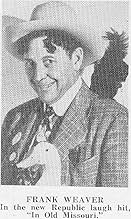Frank Weaver(1891-1967)
- Actor
- Soundtrack
The mute male member of the popular musical comedy hillbilly trio "The
Weaver Brothers and Elviry," Frank was known as "Cicero" and, similar
to Harpo Marx's act, performed silently on
stage via pantomime, gesturing and whistling while the other two
provided active voices.
Born on February 2, 1891, in Ozark, Missouri, Frank was raised on a farm, and was inspired by older brother Leon Weaver to leave farm living and venture into a life of entertainment. Their parents, always musically inclined, encouraged the brothers and they grew up becoming efficient on several home-made instruments. After Leon struck out on his own and earned a place as part of the Doctor A.B. Christy's Traveling Medicine Show, Frank eventually joined the shows as well. In these medicine show performances, the actors were often utilized to sell "cure-all elixirs".
Frank left the medicine show circuit after WWI broke out and he served in the military. He rejoined his older brother in 1921 and they worked up "The Weaver Brothers" act, which was discovered by Alexander Pantages, who signed them up. Out on the vaudeville circuit, they gained a name and eventually Leon's wife, June joined the act as "The Weaver Brothers and Elviry" and the hayseed trio subsequently rose to the top at the Grand Ole Opry and in various theater halls. They also found audiences abroad in Europe, and one of their tours culminated in a command performance for the Queen of England.
Leon and June's marriage broke up after nine years and they divorced. Surprisingly, younger brother Frank and June fell in love and married. This fortunately did not hurt the trio's reputation, however, and the trio remained in tact and amicable. At their peak, "The Weaver Brothers and Elviry" shared billing with such top acts as Al Jolson, Beatrice Lillie, Jack Benny and George Burns and Gracie Allen.
Warner Brothers decided to parlay their Grand Ole Opry fame to film and the cornpone trio first appeared in support opposite none other than Humphrey Bogart, Penny Singleton and Louise Fazenda in Swing Your Lady (1938). Republic Studios moved in quickly to feature the group in their own money-making song-and-dance comedy vehicles for the next several years. Down in 'Arkansaw' (1938) with Ralph Byrd, Jeepers Creepers (1939) with Roy Rogers, In Old Missouri (1940), Grand Ole Opry (1940), Tuxedo Junction (1941), Shepherd of the Ozarks (1942), The Old Homestead (1942) and Mountain Rhythm (1943) were not very popular with the critics, but war-era film audiences nevertheless enjoyed the hokey escapism they provided with their silly but folksy homespun gags and musical talents on prime display. A niece, Loretta Weaver often appeared in their films as the ingénue, Violey. Due to the Weavers' success, Republic went on to star country star Judy Canova in her own raucous, hayseed starrers.
Missing the live audience feel that films didn't provide, the trio left Hollywood by 1943 and returned to their stage roots back in the Mid-West (notably Missouri). Following Leon's death in 1950, Frank and June returned to Los Angeles. He died in 1967.
Born on February 2, 1891, in Ozark, Missouri, Frank was raised on a farm, and was inspired by older brother Leon Weaver to leave farm living and venture into a life of entertainment. Their parents, always musically inclined, encouraged the brothers and they grew up becoming efficient on several home-made instruments. After Leon struck out on his own and earned a place as part of the Doctor A.B. Christy's Traveling Medicine Show, Frank eventually joined the shows as well. In these medicine show performances, the actors were often utilized to sell "cure-all elixirs".
Frank left the medicine show circuit after WWI broke out and he served in the military. He rejoined his older brother in 1921 and they worked up "The Weaver Brothers" act, which was discovered by Alexander Pantages, who signed them up. Out on the vaudeville circuit, they gained a name and eventually Leon's wife, June joined the act as "The Weaver Brothers and Elviry" and the hayseed trio subsequently rose to the top at the Grand Ole Opry and in various theater halls. They also found audiences abroad in Europe, and one of their tours culminated in a command performance for the Queen of England.
Leon and June's marriage broke up after nine years and they divorced. Surprisingly, younger brother Frank and June fell in love and married. This fortunately did not hurt the trio's reputation, however, and the trio remained in tact and amicable. At their peak, "The Weaver Brothers and Elviry" shared billing with such top acts as Al Jolson, Beatrice Lillie, Jack Benny and George Burns and Gracie Allen.
Warner Brothers decided to parlay their Grand Ole Opry fame to film and the cornpone trio first appeared in support opposite none other than Humphrey Bogart, Penny Singleton and Louise Fazenda in Swing Your Lady (1938). Republic Studios moved in quickly to feature the group in their own money-making song-and-dance comedy vehicles for the next several years. Down in 'Arkansaw' (1938) with Ralph Byrd, Jeepers Creepers (1939) with Roy Rogers, In Old Missouri (1940), Grand Ole Opry (1940), Tuxedo Junction (1941), Shepherd of the Ozarks (1942), The Old Homestead (1942) and Mountain Rhythm (1943) were not very popular with the critics, but war-era film audiences nevertheless enjoyed the hokey escapism they provided with their silly but folksy homespun gags and musical talents on prime display. A niece, Loretta Weaver often appeared in their films as the ingénue, Violey. Due to the Weavers' success, Republic went on to star country star Judy Canova in her own raucous, hayseed starrers.
Missing the live audience feel that films didn't provide, the trio left Hollywood by 1943 and returned to their stage roots back in the Mid-West (notably Missouri). Following Leon's death in 1950, Frank and June returned to Los Angeles. He died in 1967.





















